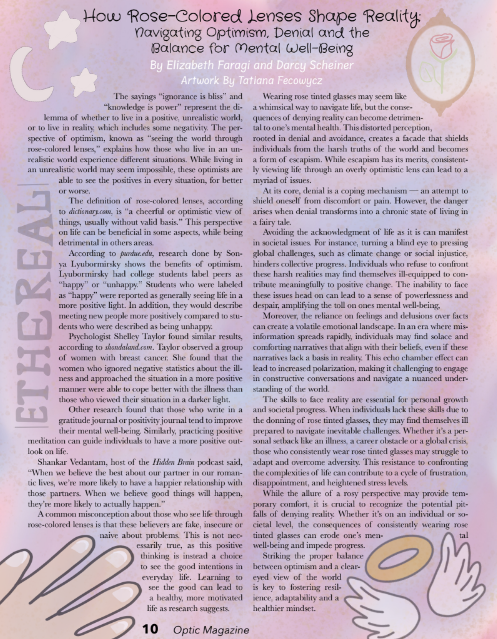The sayings “ignorance is bliss” and “knowledge is power” represent the dilemma of whether to live in a positive, unrealistic world, or to live in reality, which includes some negativity. The perspective of optimism, known as “seeing the world through rose-colored lenses,” explains how those who live in an unrealistic world experience different situations. While living in an unrealistic world may seem impossible, these optimists are able to see the positives in every situation, for better or worse.
The definition of rose-colored lenses, according to dictionary.com, is “a cheerful or optimistic view of things, usually without valid basis.” This perspective on life can be beneficial in some aspects, while being detrimental in others areas.
According to purdue.edu, research done by Sonya Lyubormirsky shows the benefits of optimism. Lyubormirsky had college students label peers as “happy” or “unhappy.” Students who were labeled as “happy” were reported as generally seeing life in a more positive light. In addition, they would describe meeting new people more positively compared to students who were described as being unhappy.
Psychologist Shelley Taylor found similar results, according to shondaland.com. Taylor observed a group of women with breast cancer. She found that the women who ignored negative statistics about the illness and approached the situation in a more positive manner were able to cope better with the illness than those who viewed their situation in a darker light.
Other research found that those who write in a gratitude journal or positivity journal tend to improve their mental well-being. Similarly, practicing positive meditation can guide individuals to have a more positive outlook on life.
Shankar Vedantam, host of the Hidden Brain podcast said, “When we believe the best about our partner in our romantic lives, we’re more likely to have a happier relationship with those partners. When we believe good things will happen, they’re more likely to actually happen.”
A common misconception about those who see life through rose-colored lenses is that these believers are fake, insecure or naive about problems. This is not necessarily true, as this positive thinking is instead a choice
to see the good intentions in everyday life. Learning to see the good can lead to a healthy, more motivated
life as research suggests.
Wearing rose tinted glasses may seem like a whimsical way to navigate life, but the consequences of denying reality can become detrimental to one’s mental health. This distorted perception, rooted in denial and avoidance, creates a facade that shields individuals from the harsh truths of the world and becomes a form of escapism. While escapism has its merits, consistently viewing life through an overly optimistic lens can lead to a myriad of issues.
At its core, denial is a coping mechanism — an attempt to shield oneself from discomfort or pain. However, the danger arises when denial transforms into a chronic state of living in a fairy tale.
Avoiding the acknowledgment of life as it is can manifest in societal issues. For instance, turning a blind eye to pressing global challenges, such as climate change or social injustice, hinders collective progress. Individuals who refuse to confront these harsh realities may find themselves ill-equipped to contribute meaningfully to positive change. The inability to face these issues head on can lead to a sense of powerlessness and despair, amplifying the toll on ones mental well-being,
Moreover, the reliance on feelings and delusions over facts can create a volatile emotional landscape. In an era where misinformation spreads rapidly, individuals may find solace and comforting narratives that align with their beliefs, even if these narratives lack a basis in reality. This echo chamber effect can lead to increased polarization, making it challenging to engage in constructive conversations and navigate a nuanced understanding of the world.
The skills to face reality are essential for personal growth and societal progress. When individuals lack these skills due to the donning of rose tinted glasses, they may find themselves ill prepared to navigate inevitable challenges. Whether it’s a personal setback like an illness, a career obstacle or a global crisis, those who consistently wear rose tinted glasses may struggle to adapt and overcome adversity. This resistance to confronting the complexities of life can contribute to a cycle of frustration, disappointment, and heightened stress levels.
While the allure of a rosy perspective may provide temporary comfort, it is crucial to recognize the potential pitfalls of denying reality. Whether it’s on an individual or societal level, the consequences of consistently wearing rose tinted glasses can erode one’s mental well-being and impede progress.
Striking the proper balance between optimism and a clear-eyed view of the world is key to fostering resilience, adaptability and a healthier mindset.

